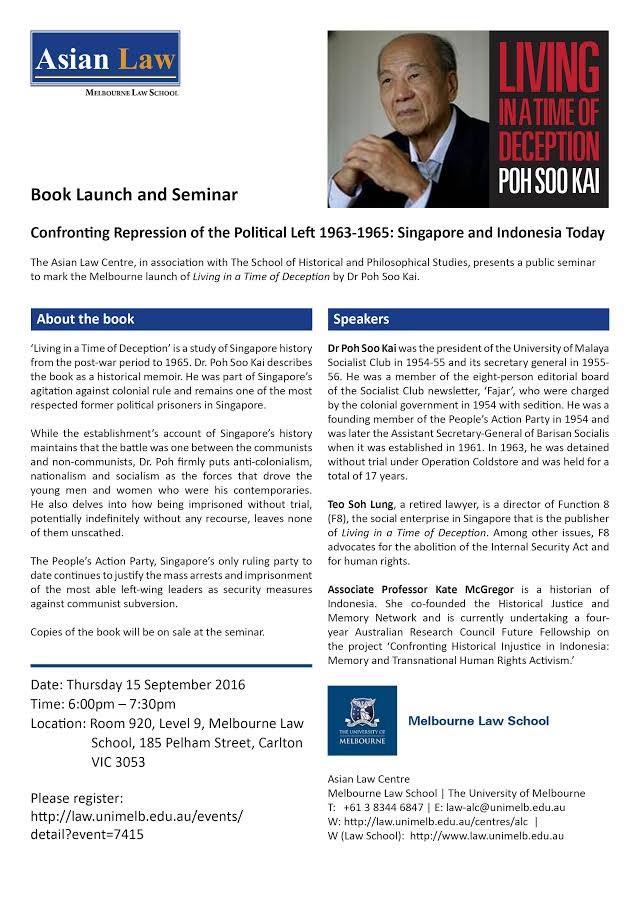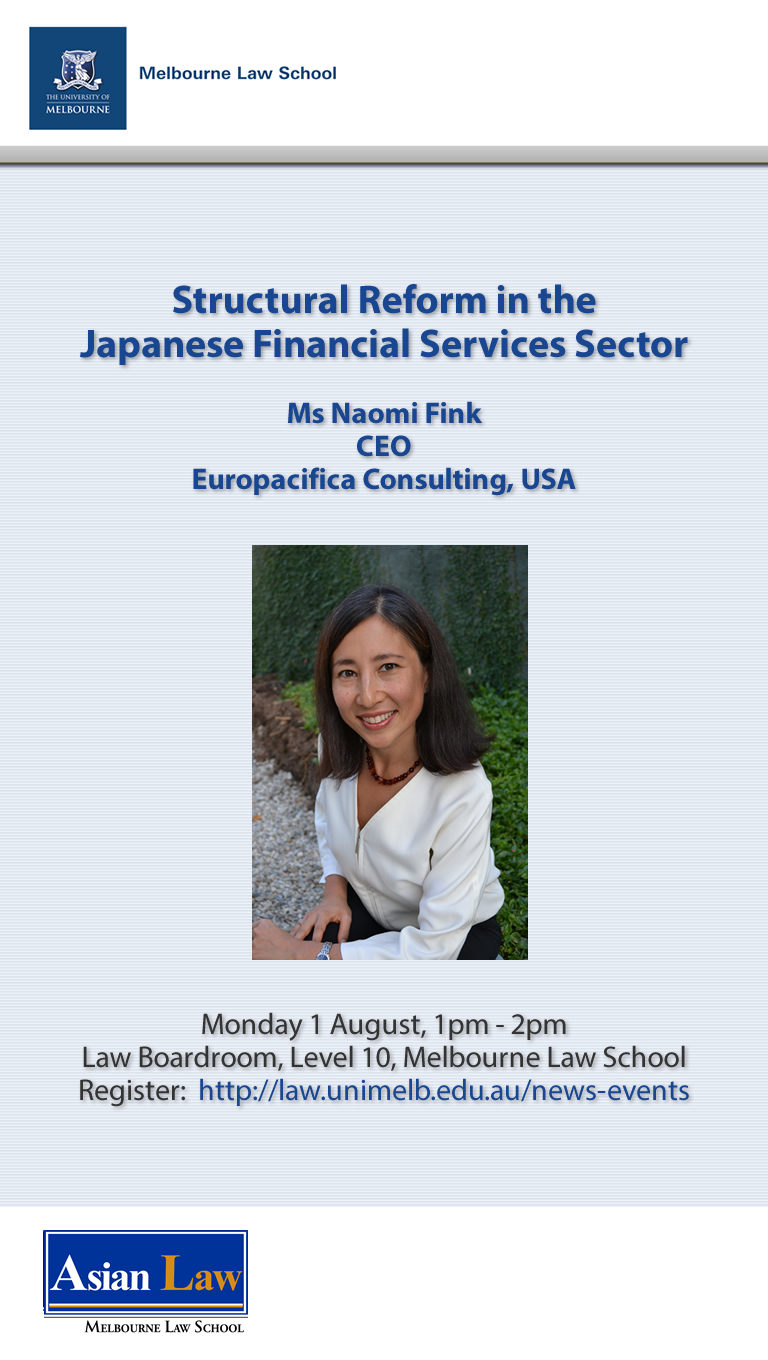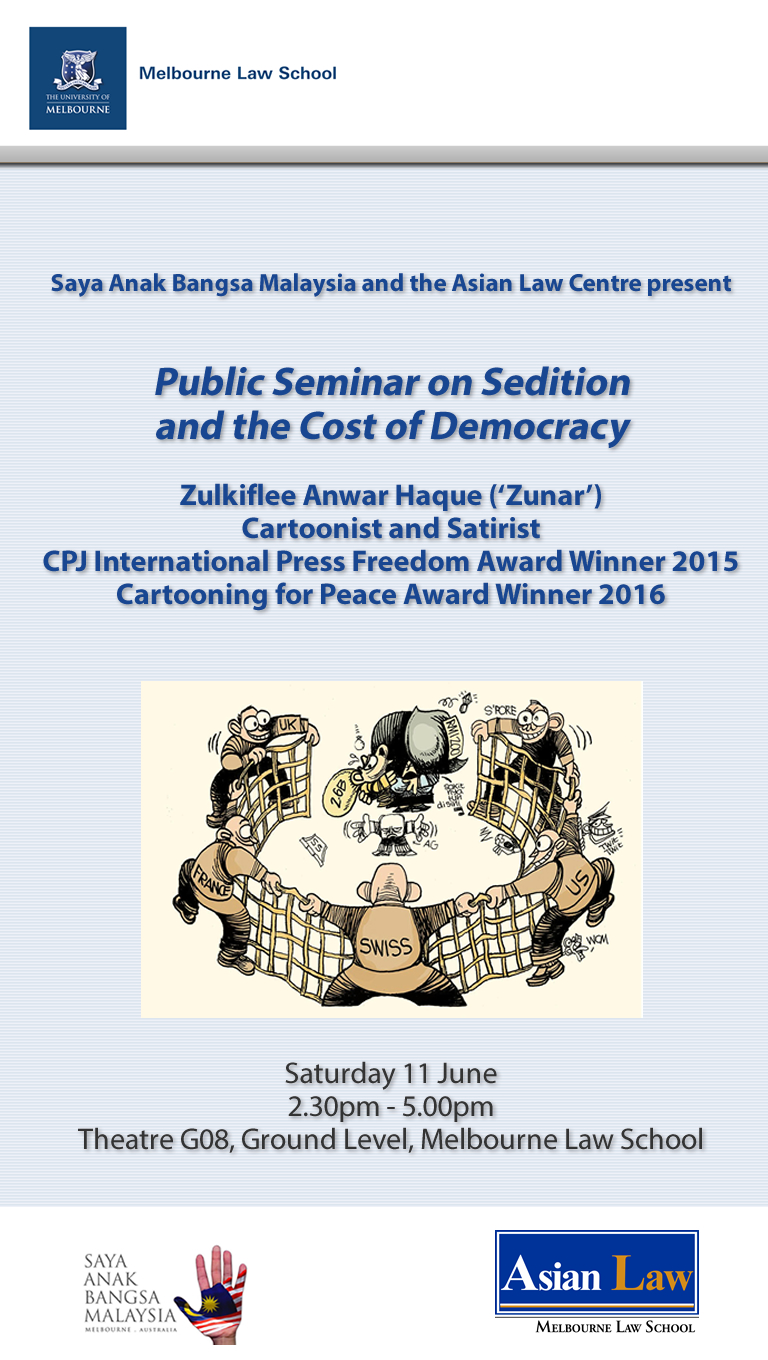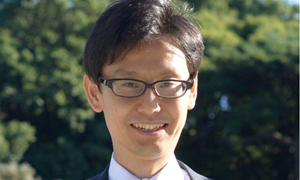2016 Past Events
Confronting Repression in Singapore
- "Confronting Repression of the Political Left 1963-1965: Singapore and Indonesia Today"
Dr Poh Soo Kai, Teo Soh Lung, Associate Professor Kate McGregor
Hosted by the Asian Law Centre
17 September 2016
- "Japanese Security Policy Under Prime Minister Abe: A Revival of Militarism"
Professor Glenn D Hook
Hosted by the Asian Law Centre and the Asia Institute
12 September 2016
- "Confucian Constitutionalim in East Asia"
Dr Bui Ngoc Son
Hosted by the Asian Law Centre and the Centre for Comparative Constitutional Studies
17 August 2016About the Book
Confucian Constitutionalism in East Asia (Routledge, 2016) Western liberal constitutionalism has expanded recently, with, in East Asia, the constitutional systems of Japan, South Korea and Taiwan based on Western principles, and with even the socialist polities of China and Vietnam having some regard to such principles. Despite the alleged universal applicability of Western constitutionalism, however, the success of any constitutional system depends in part on the cultural values, customs and traditions of the country into which the constitutional system is planted. This book explains how the values, customs and traditions of East Asian countries are Confucian, and discusses how this is relevant to constitutional practice in the region. The book explores classical ideas and imperial practice of Confucian constitutionalism, intellectual efforts to integrate Confucianism with modern constitutionalism, and develop a normative theory of mixed constitutionalism in the contemporary East Asia. The book has implications for both comparative political theory and comparative constitutional inquiry.
About the author
Bui Ngoc Son is a research fellow of the Centre for Asian Legal Studies, Faculty of Law, National University of Singapore, when he was previously a postdoctoral fellow. He is a PhD from The University of Hong Kong. He was a visitor at Melbourne Law School, a visiting researcher at Harvard Law School, and a visiting scholar at Tsinghua Law School. He is the author of the book Confucian Constitutionalism in East Asia (Routledge, 2016). His articles have been published or forthcoming in American Journal of Comparative Law, Law & Social Inquiry, University of Illinois Law Review, The Journal of Comparative Law, Chinese Journal of Comparative Law, Loyola of Los Angeles International and Comparative Law Review, Australian Journal of Legal Philosophy, among others. He has also published 8 books and numerous articles in Vietnamese. His research interests include: legal change in the contemporary socialist world, Asian legal systems, Asian legal and political philosophy, Asian comparative constitutional law, and comparative constitutional theory.

- "Structural reform in the Japanese Financial Services Sector"
Ms Naomi Fink, CEO Europacifica Consulting
Hosted by the Asian Law Centre
1 August 2016
2006 was a watershed year for financial and economic reform in Japan. The then Prime Minister’s reformist agenda included reforms to the national budget system, special public corporations, medical insurance, national pension systems, and postal savings and insurance system. 2006 saw the implementation of the comprehensive New Companies Law, as well as the Financial Instruments and Exchange Law (FIEL), which represented large-scale revision of Japan’s Securities and Exchange Law. The privatization of Japan Post was legislated the same year, a political coup for PM Koizumi.
The outcome of Koizumi’s reforms receives a poor popular reception, given Japan’s subsequent lapse into deflationary stagnation. PM Koizumi stepped down in 2006, upon which postal privatisation was diluted, subsequently shelved under the DPJ administration. The New Companies Act was criticised for its insufficiency in improving Japanese corporate governance. Meanwhile, the implementation of FIEL (Japan’s answer to Sarbanes-Oxley in the US), while stringent its objectives of protecting investors from malfeasance (and thus increasing confidence in the financial sector), is pilloried for having unintentionally slowed investment.
Nonetheless, in retrospect we might have more to learn from Koizumi’s 2006 financial reforms, despite its generally negative review. 2006 reforms provided a springboard for subsequent reform in the sector, including PM Abe’s agenda today. Analysis of the 2006 reforms, their strengths and weaknesses, combined with empirical analysis of drivers of total factor productivity in the services sector gives us clues on the ingredients for successful reforms going forward.
- "Roundtable Session with Environmental Lawyer Ritwick Dutta"
Hosted by the Asian Law Centre and the Centre for Resources, Energy and Environmental Law
28 July 2016An interactive roundtable with India's foremost environmental lawyer.
Presenter Ritwick Dutta is an Environmental Lawyer & Managing Trustee, Legal Initiative for Forest and Environment. He has focused exclusively on environmental litigation and has supported communities, civil society groups and affected citizens in bringing environmental issues before the Court. His principle focus is the National Green Tribunal where he also serves as the Secretary of the National Green Tribunal Bar Association. Ritwick is an Ashoka Fellow and is the recipient of the Carl Zeiss Roll of Honour 2005. The Sanctuary ABN AMRO Award 2007, the NDTV Green Hero Award 2010, the Balipara Foundation Award 2015. He is the Board member of NGO Platform on Shipbreaking and leads The Access Initiative – South Asia, the largest network of CSO’s working on access to information, public participation & access to justice. He has authored 13 books on environmental law including the Supreme Court on Forest Conservation and National Green Tribunal published by Universal Law Publishing.

- "Using Social Impact Bonds to Fund Projexts: Austalia, Asia and Beyond"
Professor Jasper Kim, Ms Fabienne Michaux, Mr Malcolm Garrow and Mr Jeremy King
Hosted by the Asian Law Centre, the Centre for Corporate Law and Securities Regulation and Corrs Chambers Westgarth
12 July 2016Presenters Professor Jasper Kim, Gaduate School of International Studies, Eqha University, South Korea
Ms Fabienne Michaux, Member of the Australian Advisory Board (AAB) on Impact Investing, Chair of the AAB's Market Building Working Group
Mr Malcolm Garrow, Director - Consulting, Social Ventures Australia
Mr Jeremy King, Partner and Chairman, Pro Bono & Comunity, Corrs Chambers Westgarth
- "The Development of Islamic Banking in Malaysia"
Datuk Dr Nik Norzrul Thani
Hosted by the Asian Law Centre and the Transactional Law Group
5 July 2016In this seminar, Datuk Dr Nik Norzrul Thani spoke on Islamic Banking in Malaysia and identified the opportunities and challenges, both for legal practitioners and also for market participants.
Presenter Datuk Dr Nik Norzrul Thani is Senior Partner of ZICOlaw in Kuala Lumpur and an Honorary Fellow at Melbourne Law School. He advises clients on a wide range of legal matters incorporating Islamic finance, banking, offshore finance, debt restructuring, international, corporate and commercial law.
Mr Datuk Dr Nik was a Visiting Fulbright Scholar at Harvard Law School from 1996 to 1997, and a Chevening Fellow at the Oxford Centre for Islamic Studies, Oxford University. He was also formerly the Acting Dean/Deputy Dean of the Faculty of Laws, International Islamic University Malaysia.
He has published and spoken extensively in the area of Islamic finance, including as co-author of Law and Practice of Islamic Banking & Finance, Sweet & Maxwell, 2003 (First Edition) and 2010 (Second Edition).

- "Culture in Law and Development: Nurturing Positive Change"
Professor Lan Cao
Hosted by the Asian Law Centre and the Institute for International Law and the Humanities
23 June 2016The standard law and development template includes predictable prescriptions such as drafting laws and constructing institutions. These are important steps towards the establishment of a state that is appropriately subject to the constraints of law.
However, this emphasis on the institutional and technocratic dimensions of law and development has created a systemic blind spot to culture. Professor Cao urges law and development scholars and practitioners to reject the acultural tradition of related fields such as public and private international law and even international human rights law, to instead embark on a respectful but robust engagement with culture.
Presenter Professor Lan Cao is the Betty Hutton Williams Professor of International Economic Law at Chapman Law School in Orange, California. She is a graduate of Mount Holyoke College and Yale Law School and worked as a litigation and corporate attorney at Paul, Weiss, Rifkind, Wharton & Garrison in New York City for many years until she joined legal academia as a law professor. She has taught at Brooklyn Law School, Duke Law School, Michigan Law School, and William & Mary Law School. Her scholarly and teaching interests include public international law, international human rights, international trade, international business and law and development.
She is the author of Culture in Law and Development: Nurturing Positive Change (Oxford University Press 2016) as well as many law review articles on international law and economic development. She is also the author of two critically acclaimed novels Monkey Bridge (1997) and The Lotus and the Storm (2014), both published by Viking. Michiko Kakutani of The New York Times wrote of Monkey Bridge, "Cao has not only made an impressive debut, but joined authors such as Salman Rushdie and Bharati Mukherjee in mapping the state of exile and its elusive geographies of loss and hope.”
She was born in Saigon, Vietnam and came to the United States in 1975 after the end of the war in Vietnam.
- "Public Seminar on Sedition and the Cost of Democracy"
Zulkiflee Anwar Haque
Hosted by the Asian Law Centre and Saya Anak Bangsa Malaysia
11 June 2016Presenter Zulkiflee Anwar Haque ('Zunar'), Cartoonist and Satirist, CPJ International Press Freedom Award Winner, 2015 and Cartooning for Peace Award Winner, 2016.
- "Constitutional Faith: The Indian Constitution in the 21st Century"
Professor Sudhir Krishnaswamy
Hosted by the Asian Law Centre and the Indian Council for Cultural Relations
5 May 2016On November 26th 2015 the Bharatiya Janata Party (BJP) led Central Government introduced a new 'Constitution Day' to commemorate the adoption of the Final Draft Constitution by the Constituent Assembly on November 26th, 1949. India has historically celebrated Republic Day on 26th January each year to mark the day on which the Constitution of India, 1950 came into force. The Parliamentary debate on Constitution Day in 2015 laid bare the political contestation around these ceremonial events. Opposition parties alleged that the BJP was inserting itself into India's constitutional lineage to obscure its historical absence in the freedom movement or enthusiasm for the Constituent Assembly. The ruling party asserted that it sought to acknowledge and celebrate the contribution of Dr Ambedkar as the architect of the constitution. These political exchanges hint at but not identify a more surprising and remarkable puzzle: why has the BJP abandoned its historical antagonism to and ambivalence about the Indian constitution? A party that attempted to revise and rewrite the constitution when it first came to power in 2002, seeks to celebrate and commemorate the 'Constitution' a mere 12 years later!
In this lecture, Professor Krishnaswamy explored and explained this dramatic transformation in the BJP's political commitment to the Constitution of India, 1950. He argued that at the core of this transformation is a fundamental reworking of three strands of constitutional meaning: first, the Constitution is recast as a political document that represents the traditional 'civilizational ethos' of a 5000 year culture rather than as a modern political document crafted by a revolutionary Independence movement.
He also discussed the idea that citizens should venerate the Constitution as a 'holy book' that encodes a majoritarian national ethos that is placed above public criticism. Thirdly, that the Constitution be read not as a document that imposes constraints on majoritarian political power but one that authorizes the relentless pursuit of 'national' pride. Unlike the attempt to revise and rewrite the constitution in 2002 where a formal process of constitutional change was preferred, this ongoing radical transformation of constitutional meaning is sought to be achieved through media assisted popular re-reading of the Constitution.
This political transformation of constitutional meaning elevates and emphasizes some parts of the constitution (like the provisions relating to cow slaughter) and disregards parts of the constitution (the status of the Upper House of the legislature) that resist this re-reading of the constitution. For this ambitious political project to succeed, popular meaning must over time replace the current constitutional understanding at three key non-political actors: civil society, lawyers and legal academics and the courts. The future of the Indian constitution in the 21st century will be shaped by how these actors respond to this new
Presenter Sudhir Krishnaswamy is a Professor of Law and Director of the School of Policy and Governance at the Azim Premji University, Bangalore. He visited Columbia Law School as a the Visiting Dr Ambedkar Chair Professor in Indian Constitutional Law from 2012-2015. His primary academic interests are in Indian constitutional and administrative law as well as law and development issues with a focus on legal system reform. He has a D. Phil in Law and Bachelor of Laws degree from Oxford University and a Bachelors of Arts and Law (Honours) from the National Law School of India University Bangalore.

- Roundtable on "Academic Freedom in India: A Discussion of Recent Events"
Associate Professor Farrah Ahmed
Hosted by the Asian Law Centre
19 April 2016
- "Chinese Conceptions of the Ombudsman: Convergence or Divergence"
Dr Stephen Thomson
Hosted by the Asian Law Centre and the Centre for Comparative Constitutional Studies
15 April 2016Are Chinese conceptions of the ombudsman on a path of convergence or divergence? Dr Thomson asked this question of the principal ombudsman institutions in the Greater China region: the Ministry of Supervision (Mainland China), Ombudsman (Hong Kong), Commission Against Corruption (Macau) and Control Yuan (Taiwan). To what extent do these institutions embody common values in the supervision of public administration? Are they essentially performing the same function in each jurisdiction, or do the differences between them in terms of structural design, powers and processes suggest diverse conceptions of the ombudsman? Taken as a whole, what is the overall trend in terms of convergence or divergence? These questions are generally important for comparing state institutions, but also in the specific context of the Greater China region.
Against the background of Hong Kong and Macau's finite guarantee of autonomy as Special Administrative Regions, and the enduring possibility of the reunification of the People's Republic of China and Taiwan, there is a particular need to contrast the institutions of this region and consider their potential for alignment or harmonisation.
Presenter Dr. Stephen Thomson is an Assistant Professor at the Chinese University of Hong Kong (CUHK) and Legal Adviser to the Ombudsman of Hong Kong. He leads teaching in administrative law at CUHK, and is an instructor in administrative law on Continuing Professional Development courses accredited by the Law Society of Hong Kong. Dr. Thomson obtained his Ph.D. at the University of Edinburgh, where he taught several courses on constitutional and administrative law. His work has appeared in UK, US and Hong Kong law journals, and he is the author of the leading book on equitable jurisdiction in Scotland.

- "Educational Intervention in Japanese Juvenile Proceedings"
Ms Yoshiko Ohmachi
Hosted by the Asian Law Centre and the Criminology Descipline in the School of Social and Political Sciences
14 April 2016Ms Yoshiko Ohmachi spoke about Japanese juvenile proceedings and shared several cases. All juvenile cases are handled by Family Courts in Japan. Family Court Probation Officers are required to investigate the juvenile’s character, development, relationship with other people and living conditions, to understand why the crime was committed by the juvenile. Judges consider all circumstances and decide appropriate treatment for individual offenders. One trait of Japanese juvenile proceedings is ‘educational intervention,’ whereby Family Court Probation Officers meet with juveniles and hold group conferences to allow them to reflect on their crime. Following this, Judges discuss what action should be taken in hearing proceedings. The Family Court provides juveniles a variety of educational interventions, in order to prevent their re-offending.
Presenter Ms Yoshiko Ohmachi is a Family Court Probation Officer in Japan. After obtaining a Bachelor of Education degree from Kyoto University, she was appointed as an Assistant Family Court Probation Officer in 2008. After completing the two-year training course at the Training and Research Institute for Court Officials, she was appointed as a Family Court Probation Officer in 2010. Ms Ohmachi has been involved in juvenile cases, parenting cases, child protection cases and other family related cases in the Family Court. She was studying at the Australian National University College of Law through the Overseas Training Program of the Supreme Court of Japan.

- "A Cruel Game of Chance: Administration of the Death Penalty in India"
Dr Anup Surendranath
Hosted by the Asian Law Centre, Centre for Indonesian Law, Islam and Society, and Reprieve Australia
22 March 2016Based on interviews with all of India’s death row prisoners and their families between June 2013 and January 2015, the Centre on the Death Penalty at National Law University, Delhi has documented the socio-economic profile of prisoners under the sentence of death along with mapping their interaction with various aspects of the Indian criminal justice system. While discussing issues of discrimination, custodial torture, incompetent representation, prison conditions and alienation from the legal system in the context of his work with death row prisoners, in this seminar, Dr. Anup Surendranath also reflected on the Centre’s experience in providing pro bono representation to over 40 death row prisoners in the last 18 months. Dr. Anup Surendranath is the Director of the Centre on the Death Penalty at National Law University, Delhi.
Presenter Dr. Anup Surendranath is the Director of the Centre on the Death Penalty at National Law University, Delhi. After obtaining his law degree from NALSAR University of Law, Hyderabad (India), he was a Felix Scholar at the University of Oxford between 2007-12 where he was awarded the BCL (Distinction), M.Phil in Law (Distinction) and the D.Phil in Law. He had the rare honour of being invited by the Supreme Court of India to serve as a Deputy Registrar (Research) in May 2014, an academic appointment last made in the late 80s. Dr. Surendranath resigned from this post in light of the Supreme Court’s handling of Yakub Memon’s execution in July 2015.

- "Chinese Insolvency Law Workshop"
Associate Professor Jin Chun, Mr Ren Yimin, Professor Han Changyin, Mr Chi Weihong
Co-hosted by the Asian Law Centre and Ashurst
7 March 2016Presenters Associate Professor Jin Chun, from the Faculty of Law, Doshisha University, spoke on 'Overview of the Enterprise: Bankruptcy Law of China and Cross-Border Insolvency'
Mr Ren Yimin, VP and Partner at Zhejiang Capital & Equity Law Firm, spoke on the 'Role of Insolvency Professionals under the Enterprise Bankruptcy Law of China'
Professor Han Changyin, KoGuan Chair Professor of Law at Shanghai Jiao Tong University Law School spoke on the 'Treatment of Secured Creditors under the Enterprise Bankruptcy Law of China'
Mr Chi Weihong, Senior Consultant at Dentons (Guangzhou) Law Offices spoke on the 'Latest Developments in Enterprise Bankruptcy Reorganization Cases in China'.
- "Labour Dispute Resolution Organisations of Japan" A presentation in Japanese
Judge Yoshitaka Mizukura
24 February 2016Judge Mizukura discussed the various organisations in Japan which handle labour disputes, with a focus on court procedures and the role of judges. He analysed employment patterns in Japan and the regulations relating to termination which may depend on the type of employment arrangement. He also highlighted key trends and current issues surrounding termination disputes in Japan.
Presenter Judge Yoshitaka Mizukura is from the Tokyo District Court where he has heard labour dispute cases since April 2014. He was appointed as a judge in 2002 and has also recently presided over cases in the Nagoya District Court (2011-2014). Judge Mizukura is a graduate of the Faculty of Law, University of Keio.

- "International Dispute Resolution in Japan: New Developments"
Professor Susumu Masuda
Co-hosted by the Asian Law Centre and Herbert Smith Freehills, Melbourne
23 February 2016Professor Masuda explained the basic principles of laws in relation to international dispute resolution passed in Japan over the last decade. He argued that the legislation is changing practice by Japanese judges and lawyers working in this area, as well as the theoretical basis for that practice. The legislation was designed to introduce global standards in Japan, in particular in relation to certainty and predictability of commercial lawsuits, choice-of-law rules and arbitration. In some ways, the new standards surpassed those global standards. The presentation also provided an update on recent Japanese cases for practitioners of international dispute resolution.
Presenter Professor Masuda is a lawyer at Mori Hamada & Matsumoto in Tokyo and professor at Keio University Law School. He was a visiting research scholar at the Melbourne Law School and involved in Professor Richard Garnett’s international dispute resolution classes and Asian Law Centre activities. Professor Garnett is a Melbourne Law School colleague and consultant at Herbert Smith Freehills.

- A Presentation in English
Judge Satoshi Matsumoto
Hosted by the Asian Law Centre
22 February 2016Judges’ work is not limited to writing drafts of judgements. Once appointed, a Judge has a much wider range of responsibilities and quite broad authority, particularly when they deal with some cases by themselves. Drawing on their own experiences, Judges will talk about the beginning of their career, whilst also introducing their experience as a legal apprentice. Presenter
Judge Satoshi Matsumoto is the Visiting Research Scholar to visit the Melbourne Law School as part of the Supreme Court of Japan’s Overseas Training and Research Program. He graduated from Osaka University Law School and University of Tsukuba and was appointed as a judge in 2012. He has managed civil and criminal trial cases as an assistant judge in a panel.
